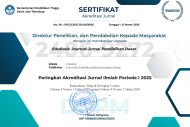Implementation of Project-Based Model in Collaborative Distance Learning System for Second Grade Elementary School
Abstract
The COVID-19 pandemic has had a major impact on the education sector, especially for schools, in the form of a change in the learning process, which currently must be done in a different space and distance. In areas with a harmless zone and inadequate for online learning, the schools have practiced two ways of learning: face-to-face and non-face-to-face. The scientific model should still be implemented eventhough in distance learning situation. This study aimed to examine the use of a project-based learning model for elementary school students to develop a collaborative distance learning system during the COVID-19 pandemic. The research method employed classroom action research from the John Elliot model. The first cycle of learning was carried out online, and the second cycle of learning was conducted face-to-face at school. The research was done in two cycles because students had limited facilities to support online learning. The data collection technique was through observation. The research subjects involved were second-grade elementary school students of SD Negeri 2 Kurung Kambing in Pandeglang Regency. This study’s results proved that the project-based model influenced increasing psychomotoric competency achievement in the SBdP (Cultural Arts and Crafts) subject with teaching materials mimicking daily and natural movements in the "Planting Corn" dance. This learning also involved students more actively and trained them to think critically and behave creatively.
Keywords
Full Text:
PDFReferences
Amanda, N. W. Y., Subagia, I. W., & Tika, I. N. (2014). Pengaruh model pembelajaran berbasis proyek terhadap hasil belajar IPA ditinjau dari self efficacy siswa. Jurnal Pendidikan dan Pembelajaran IPA Indonesia, 4(1), 1–11.
Dewi, F. (2015). Proyek buku digital: Upaya peningkatan keterampilan abad 21 calon guru sekolah dasar melalui model pembelajaran berbasis proyek. Metodik Didaktik: Jurnal Pendidikan Ke-SD-an, 9(2), 1–15.
Elliott, J. (1991). A model of professionalism and its implications for teacher education. British Educational Research Journal, 17(4), 309–318.
Jagantara, I. M. W., Adnyana, P. B., & Widiyanti, N. L. P. M. (2014). Pengaruh model pembelajaran berbasis proyek (project based learning) terhadap hasil belajar biologi ditinjau dari gaya belajar siswa SMA. Jurnal Pendidikan dan Pembelajaran IPA Indonesia, 4(1), 1–13.
Kusumastuti, E. (2014). Penerapan model pembelajaran seni tari terpadu pada siswa sekolah dasar. Mimbar Sekolah Dasar, 1(1), 7–16.
Hidayatsyah, H. (2021). Kemampuan pemecahan masalah siswa menggunakan model problem based learning berbantuan Geogebra. Jurnal Cendekia: Jurnal Pendidikan Matematika, 5(1), 458–470.
Luthvitasari, N., & Linuwih, S. (2012). Implementasi pembelajaran fisika berbasis proyek terhadap keterampilan berpikir kritis, berpikir kreatif dan kemahiran generik sains. Journal of Innovative Science Education, 1(2), 92–97.
Mahardika, L., Hermawan, R., & Riyadi, A. R. (2017). Penerapan model project based learning untuk meningkatkan kecerdasan kinestetik siswa sekolah dasar. Jurnal Pendidikan Guru Sekolah Dasar, 2(1), 15–25.
Melinda, V., & Zainil, M. (2020). Penerapan model project based learning untuk meningkatkan kemampuan komunikasi matematis siswa sekolah dasar (Studi literatur). Jurnal Pendidikan Tambusai, 4(2), 1526–1539.
Marlinda, N. L. P. M. (2012). Pengaruh model pembelajaran berbasis proyek terhadap kemampuan berpikir kreatif dan kinerja ilmiah siswa. Jurnal Pendidikan dan Pembelajaran IPA Indonesia, 2(2), 1–22.
Masrinah, E. N., Aripin, I., & Gaffar, A. A. (2019). Problem based learning (PBL) untuk meningkatkan keterampilan berpikir kritis. Seminar Nasional Pendidikan FKIP UNMA 2019, dated 8 Agustus 2019, (pp. 924–932). Universitas Majalengka.
Mustofa, Z., Susilo, H., & Muhdhar, M. H. I. A. (2016). Penerapan model pembelajaran problem based learning melalui pendekatan kontekstual berbasis lesson study untuk meningkatkan kemampuan memecahkan masalah dan hasil belajar kognitif siswa SMA. Jurnal Pendidikan: Teori, Penelitian, dan Pengembangan, 1(5), 885–889.
Padmadewi, N. N., Artini, L. P., & Utami, L. P. R. A. (2020). Teacher readiness in promoting 21st-century skills in teaching english as a foreign language at primary schools. SOSHUM: Jurnal Sosial dan Humaniora, 10(3), 271–283.
Putri, S. A., Rinanto, Y., & Marjono, M. (2015). Penerapan model problem based learning (PBL) untuk meningkatkan kemampuan berpikir kritis siswa kelas X-4 SMA Negeri Kebakkramat tahun pelajaran 2014/2015. Bio-Pedagogi: Jurnal Pembelajaran Biologi, 4(2), 39–43.
Setiawan, A. R. (2020). Lembar kegiatan literasi saintifik untuk pembelajaran jarak jauh topik penyakit coronavirus 2019 (COVID-19). Edukatif : Jurnal Ilmu Pendidikan, 2(1), 28–37.
Suci, K., Ariessanti, H. D., & Aini, Q. (2017). Penerapan iDu iLearning Plus berbasis gamification sebagai media pembelajaran jarak jauh pada perguruan tinggi. Technomedia Journal, 1(2), 37–49.
Wahidmurni. (2020). Rencana Pelaksanaan Pembelajaran: RPP 1 Lembar. (Unpublished Paper). Malang: UIN Malik Ibrahim.
Yuningsih, R. (2015). Peningkatan kecerdasan kinestetik melalui pembelajaran gerak dasar Tari Minang. Jurnal Pendidikan Usia Dini, 9(2), 233–250.
Zubaidah, S. (2019). Memberdayakan keterampilan abad ke-21 melalui pembelajaran berbasis proyek. Seminar Nasional Nasional Pendidikan Biologi, dated 12 October 2019, (pp. 1–19). Universitas Halu Oleo.
DOI: https://doi.org/10.17509/ebj.v3i1.30377
Refbacks
Copyright (c) 2021 Universitas Pendidikan Indonesia
This work is licensed under a Creative Commons Attribution 4.0 International License.
This journal is indexed by




.png)




.png)
1.png)


1.png)

.png)